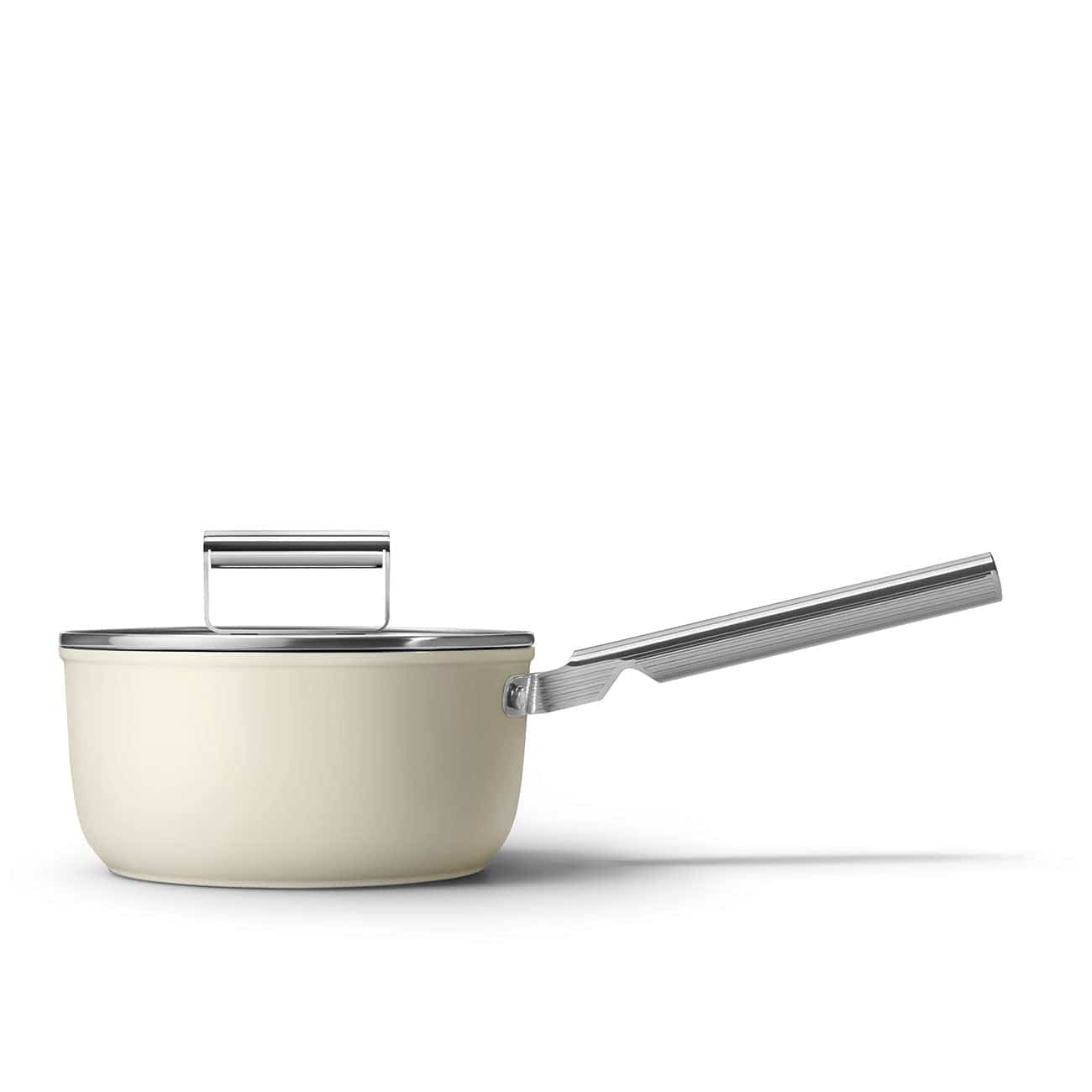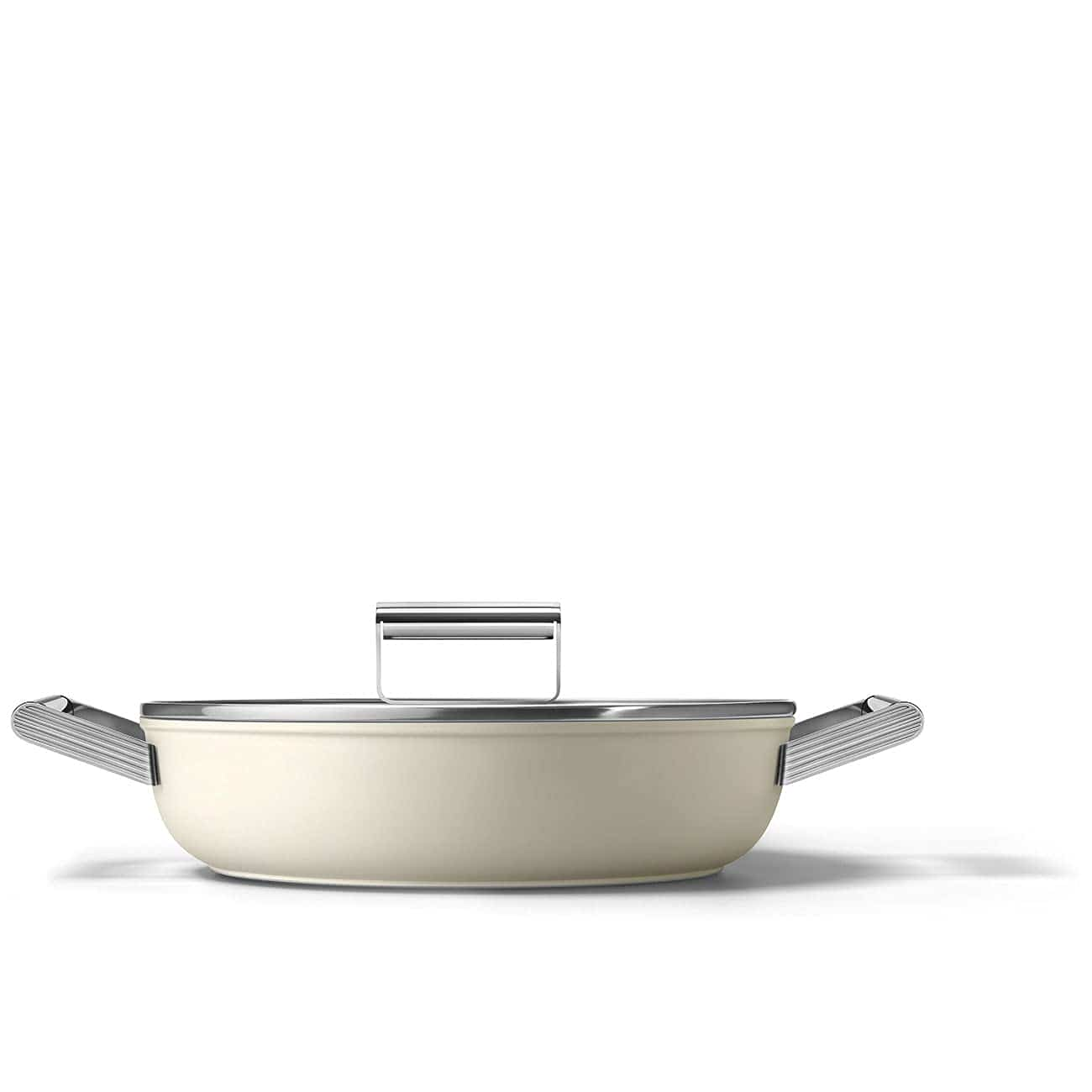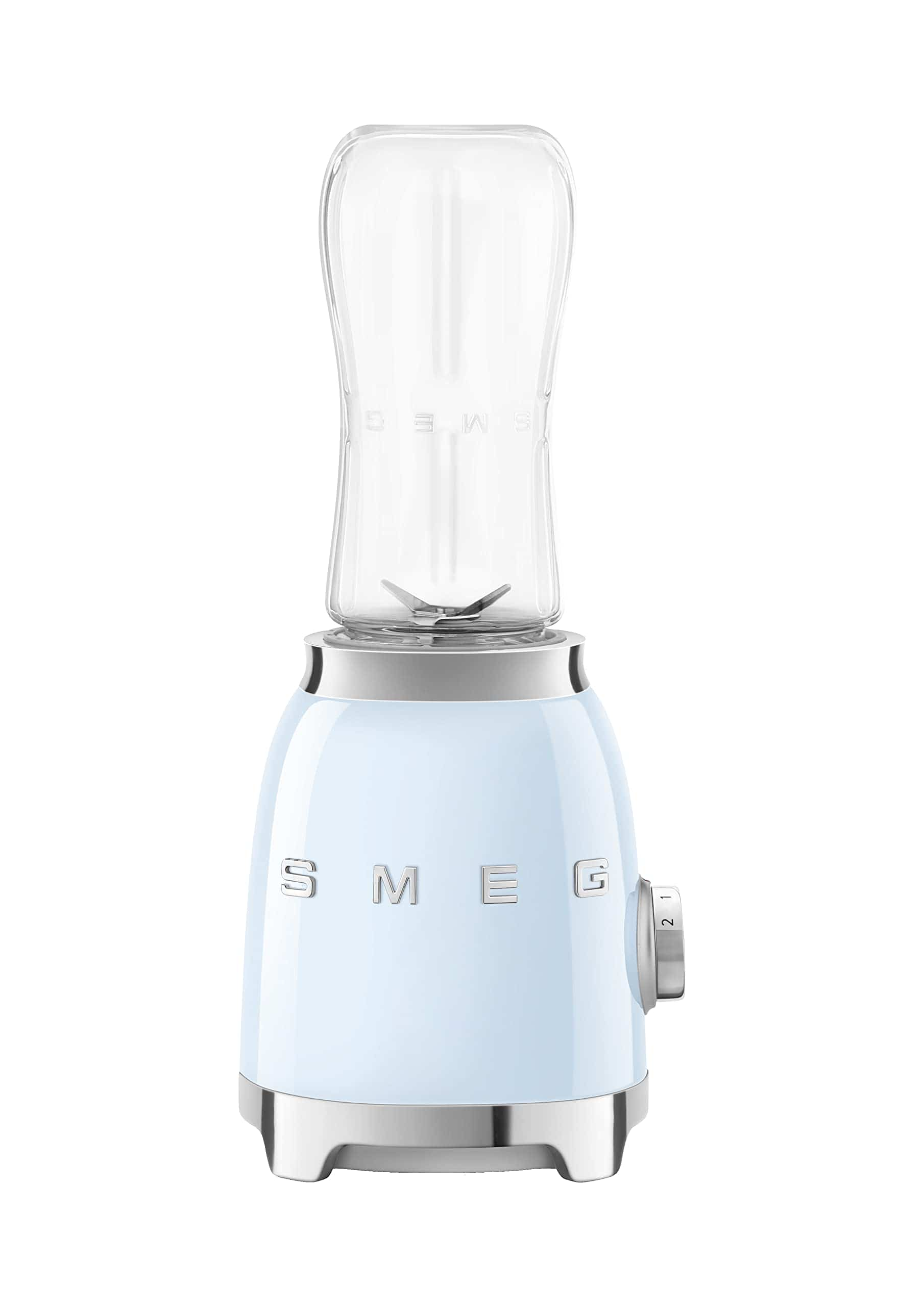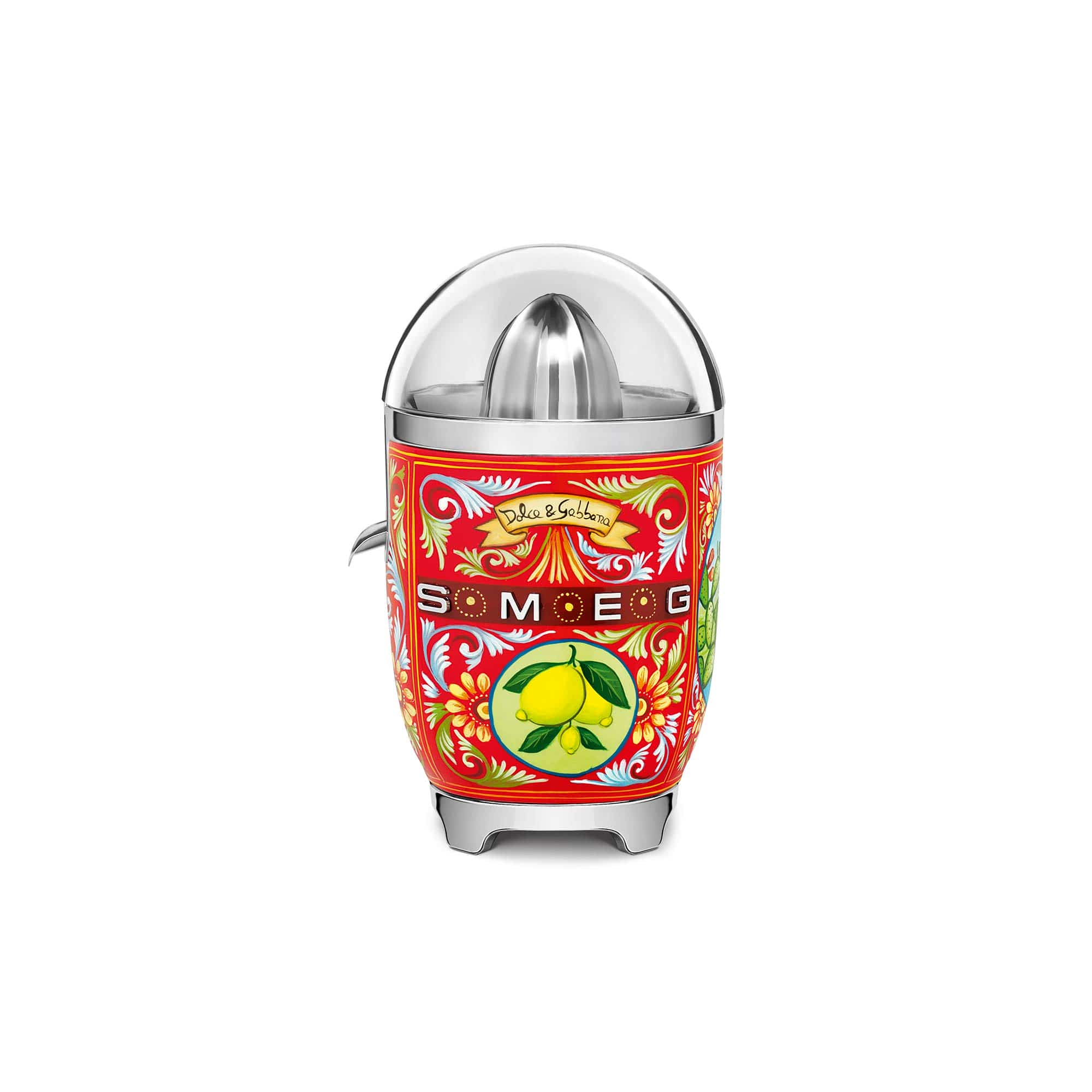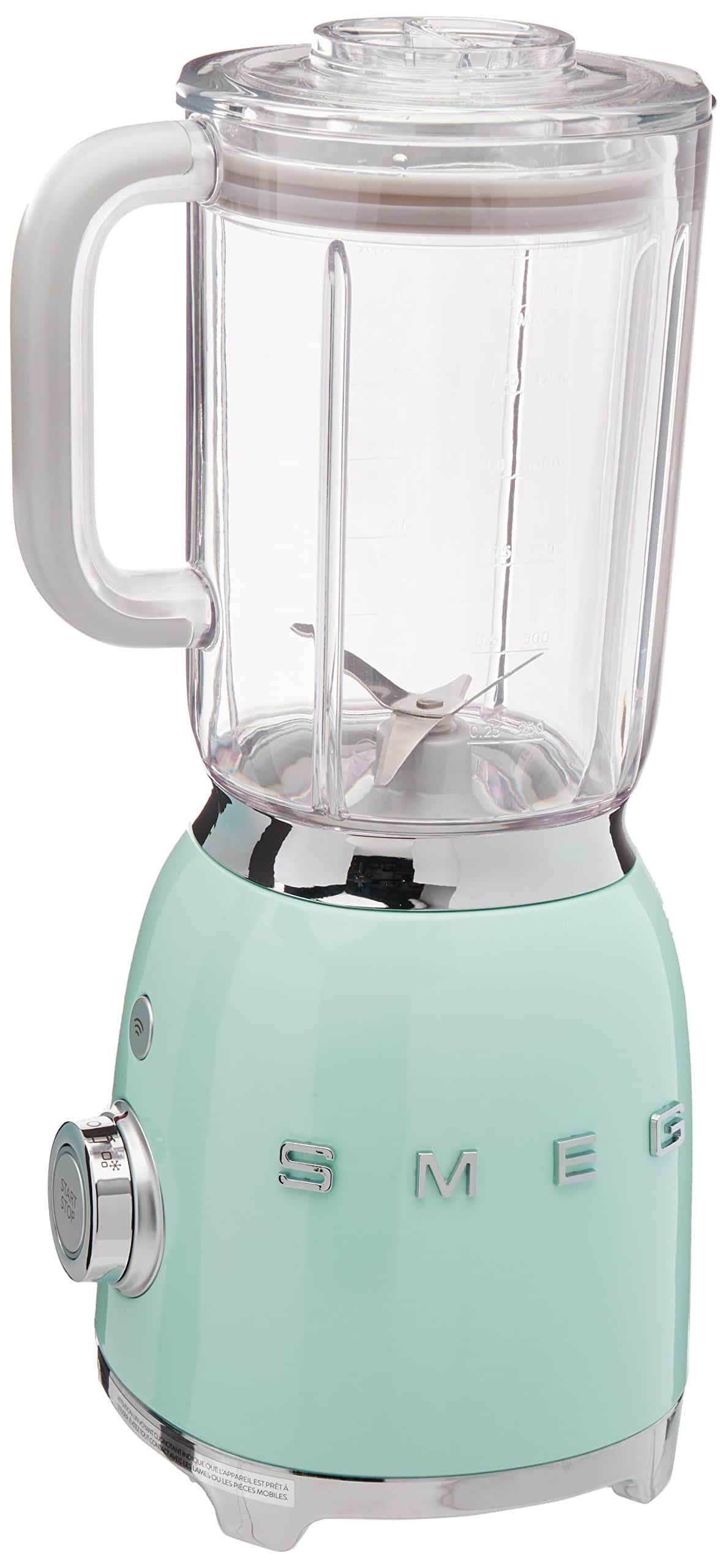Turmeric Tea
How Long to Brew Kombucha Tea
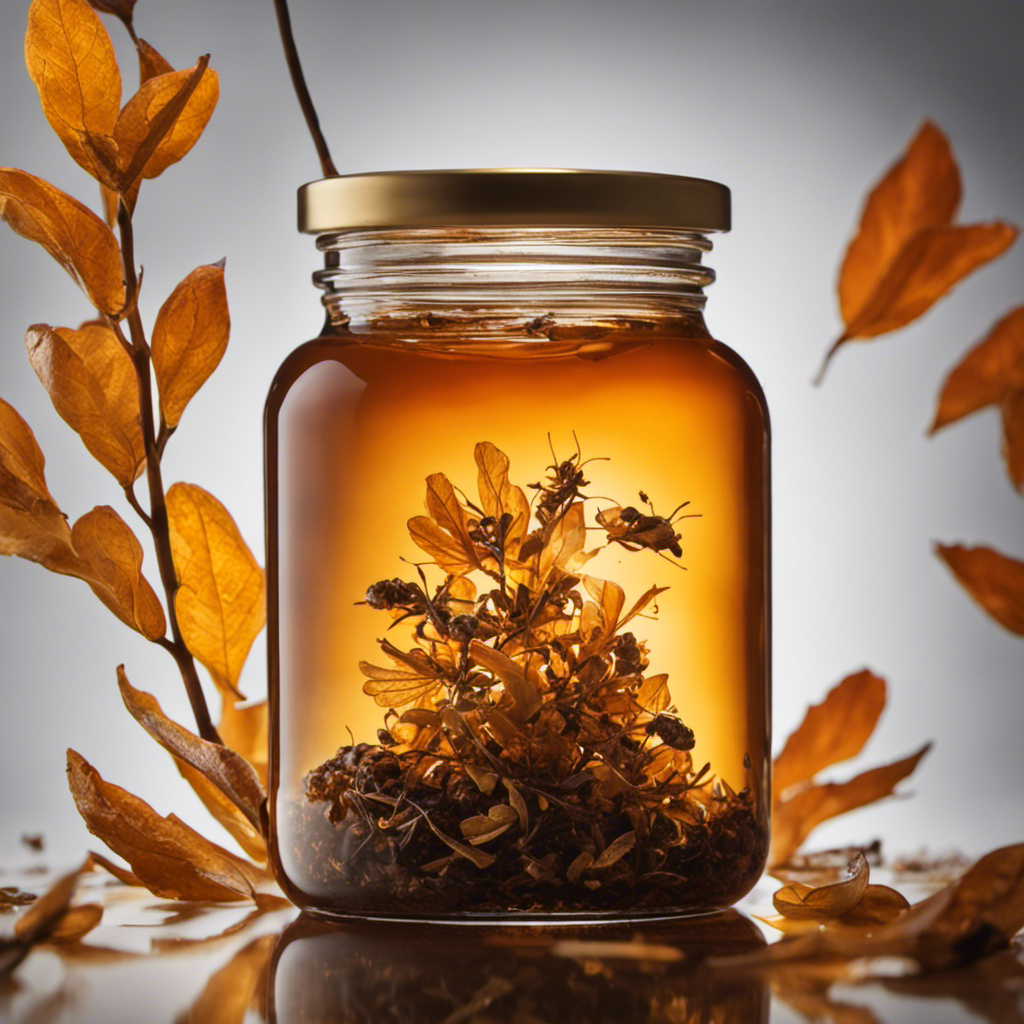
I enjoy making my own kombucha tea. One thing that always confuses me is determining the correct brewing time. It feels similar to waiting for a pot of water to boil – time just seems to drag on endlessly!
In this article, I’ll guide you through the brewing process. I’ll explain how fermentation time affects the taste and share some factors that can speed up or slow down the brewing time.
So grab your tea leaves and let’s dive in!
Key Takeaways
- The brewing temperature for kombucha tea should be between 68-85°F or 20-30°C.
- Use a glass or ceramic container for fermentation and avoid plastic or metal containers to prevent chemical leaching.
- Ferment kombucha for about a week to achieve the desired taste and carbonation.
- Factors such as temperature and the type of tea used can affect the brewing time of kombucha.
The Brewing Process
To brew kombucha tea, you’ll need to follow a specific process. First, it’s important to consider the brewing temperature. Kombucha thrives in a temperature range of 68-85°F (20-30°C). Too low, and the fermentation process may slow down or even halt. Too high, and you risk the growth of undesirable bacteria. Maintaining a consistent temperature is crucial for a successful brew.
Next, let’s talk about brewing vessels. You’ll need a glass or ceramic container to ferment your kombucha. Avoid using plastic or metal containers as they can leach chemicals or affect the taste. Make sure the vessel is clean and sanitized before use to prevent any unwanted contamination.
By understanding the importance of the brewing temperature and choosing the right vessel, you’ll be well on your way to brewing delicious and healthy kombucha tea.
Cheers to a successful brew!
Fermentation Time
You’ll want to let it ferment for about a week to achieve the desired taste and carbonation. During this time, the kombucha undergoes a fascinating transformation. Here’s what happens inside the brewing vessel:
-
The SCOBY (Symbiotic Culture Of Bacteria and Yeast) floats on the surface, feeding on the sugar in the tea and converting it into organic acids, enzymes, and carbon dioxide.
-
As the fermentation progresses, bubbles form and rise to the top, creating a fizzy texture.
-
The kombucha’s flavor profile develops, ranging from tangy and slightly sweet to more acidic and robust, depending on the brewing time.
To ensure optimal fermentation, it’s important to maintain the right temperature, usually between 75-85°F (24-29°C). Different tea varieties, such as black, green, or oolong, can also influence the fermentation process and the resulting flavor.
Now that we understand the fermentation time, let’s explore the factors that can affect the brewing time and how to adjust them accordingly.
Factors Affecting Brewing Time
Different factors, like temperature and the type of tea used, can impact how long it takes for the fermentation process to complete.
When brewing kombucha tea, the temperature plays a crucial role in determining the brewing time. Generally, the ideal temperature for kombucha fermentation is between 70 to 85 degrees Fahrenheit. Higher temperatures can speed up the fermentation process, resulting in a shorter brewing time. On the other hand, lower temperatures can slow down fermentation and prolong the brewing time.
Additionally, the type of tea used can also affect the brewing time. Black tea tends to ferment faster compared to green tea or herbal teas.
Another important factor is the kombucha SCOBY, which stands for Symbiotic Culture Of Bacteria and Yeast. A healthy and active SCOBY can ferment the tea more efficiently, reducing the brewing time.
Testing for Readiness
When testing for readiness, you can check the acidity level of your kombucha by using a pH test strip. This will give you a clear indication of the fermentation progress.
Here are two key testing methods to determine if your kombucha is ready to be enjoyed:
-
Visual Inspection:
-
Look for a thin, semi-transparent SCOBY floating on top of the liquid. It should have a smooth surface and no mold or dark spots.
-
Check for carbonation by gently pressing the bottle cap. If it gives a slight resistance, it means the carbonation is developing.
-
Taste Test:
-
Use a clean spoon to taste a small amount of kombucha. It should have a pleasant balance of tanginess and sweetness.
-
If the flavor is too sweet, it needs more time to ferment. If it is too tart or vinegary, it may have fermented for too long.
By following these testing methods, you can ensure that your kombucha reaches the desired flavor variations.
Now, let’s move on to the next section on storing and enjoying kombucha tea.
Storing and Enjoying Kombucha Tea
To maintain the quality and flavor of your kombucha, it’s important to properly store and enjoy it.
There are a few key methods for storing your kombucha to ensure it stays fresh and delicious. First, make sure to transfer your brewed kombucha into glass bottles with airtight lids. This will help preserve the carbonation and prevent any contamination.
Store the bottles in a cool and dark place, such as a pantry or refrigerator. This will slow down the fermentation process and keep your kombucha tasting its best.
When it comes to enjoying your kombucha, it’s best to consume it within a week or two of bottling. This is when it will have the most health benefits, such as probiotics and antioxidants.
Conclusion
In conclusion, brewing kombucha tea is a fascinating process that requires time and patience. The length of fermentation can vary depending on factors such as temperature, tea strength, and desired flavor.
However, on average, it takes around 7-14 days for kombucha to reach its optimal taste and carbonation. It is important to test for readiness by tasting the tea and checking for the right balance of sweetness and acidity.
Once ready, store the kombucha in airtight bottles and enjoy the health benefits of this delicious probiotic drink. According to a study published in the Journal of Food Science, kombucha consumption has been linked to improved digestion and increased immune function.
So, not only is brewing kombucha a rewarding process, but it also offers potential health benefits.
Noah, the Editor-in-Chief at Cappuccino Oracle, plays a pivotal role in shaping the voice and vision of our renowned platform. With an unwavering passion for coffee, coffee alternatives, and tea, Noah leads Cappuccino Oracle towards new horizons in the realm of coffee journalism.
Beyond his professional responsibilities, Noah serves as a mentor and guiding force for his team. His dedication to journalistic excellence and genuine love for coffee, coffee alternatives, and tea continue to inspire and motivate the Cappuccino Oracle family. In the ever-evolving world of these beverages, Noah’s leadership ensures that our platform remains at the forefront, delivering enlightening and enjoyable content to our readers worldwide.
Turmeric Tea
What Kombucha Tea Is Good for Gerd

As someone who deals with GERD, I understand the challenge of finding effective natural remedies. I was excited to find out about how **kombucha tea** could help alleviate GERD symptoms. If you want to learn more about this natural remedy, keep reading!
In this article, we’ll explore the science behind how kombucha tea can soothe GERD and offer relief. We’ll also discuss how to choose the right kombucha tea and ways to incorporate it into your GERD diet.
Get ready to brew some delicious and potentially soothing kombucha tea for your GERD!
Key Takeaways
- Kombucha tea can relieve symptoms of GERD, such as heartburn and acid reflux.
- Choosing the right kombucha tea for GERD relief involves considering soothing flavors like ginger, lemon, and chamomile, as well as low sugar and minimal added ingredients.
- Kombucha tea soothes GERD symptoms by balancing stomach acidity, reducing acid reflux, and improving digestion with its beneficial bacteria and enzymes.
- When incorporating kombucha tea into a GERD diet, it is important to monitor its effects on symptoms, consider individual responses, and take into account factors such as acidity levels, sugar content, and personal tolerance.
The Benefits of Kombucha Tea for GERD
Kombucha tea can help relieve symptoms of GERD, such as heartburn and acid reflux. The benefits of consuming kombucha tea for GERD are supported by its health effects on the digestive system.
Kombucha is a fermented beverage that contains probiotics, which are beneficial bacteria that promote gut health. These probiotics can help restore the balance of bacteria in the digestive tract, reducing symptoms of GERD.
Additionally, kombucha tea is a natural source of organic acids, such as acetic acid and gluconic acid, which can help regulate stomach acidity and prevent the excessive production of stomach acid that leads to heartburn and acid reflux.
Overall, incorporating kombucha tea into your diet can have positive effects on GERD symptoms and improve your overall digestive health.
Choosing the Right Kombucha Tea for GERD Relief
When selecting the right option, make sure to consider the flavors and ingredients that may aggravate your GERD symptoms. It’s important to find kombucha flavors that are soothing and gentle on the digestive system. Some flavors that are known to provide relief for GERD sufferers include ginger, lemon, and chamomile. These flavors have anti-inflammatory properties and can help soothe the lining of the esophagus. When looking for kombucha brands, it’s best to choose ones that are low in sugar and have a minimal amount of added ingredients. Some popular brands that cater to GERD sufferers include GT’s Living Foods, Health-Ade, and Brew Dr. Kombucha. These brands offer a variety of flavors that are suitable for individuals with GERD.
| Brand | Flavors for GERD Relief |
|---|---|
| GT’s Living Foods | Ginger, Lemon |
| Health-Ade | Ginger, Lemon |
| Brew Dr. Kombucha | Ginger, Chamomile |
| Synergy | Ginger, Lemon |
| Kevita | Lemon, Chamomile |
How Kombucha Tea Can Soothe GERD Symptoms
If you’re struggling with GERD, it’s worth exploring how kombucha can provide relief for your symptoms.
Kombucha tea is known for its many health benefits, including its potential to soothe GERD symptoms. The fermentation process of kombucha produces organic acids, such as acetic acid and gluconic acid, which can help balance the pH levels in the stomach and reduce acid reflux.
Additionally, kombucha contains beneficial bacteria and enzymes that can improve digestion and promote a healthy gut.
To make kombucha tea at home, you’ll need a SCOBY (symbiotic culture of bacteria and yeast), black or green tea, sugar, and filtered water. Simply brew the tea, add sugar, cool it down, and let the SCOBY ferment the mixture for about 7-14 days.
Enjoy your homemade kombucha tea and potentially find relief for your GERD symptoms.
Incorporating Kombucha Tea Into Your GERD Diet
To incorporate it into your GERD diet, try drinking kombucha in small amounts and monitoring how it affects your symptoms. Kombucha tea can play a role in managing GERD symptoms due to its potential beneficial effects on gut health. However, it is important to note that individual responses may vary, so it is essential to listen to your body and adjust accordingly. Here is a table outlining the potential benefits and considerations of incorporating kombucha tea into your GERD diet:
| Potential Benefits | Considerations |
|---|---|
| Probiotic properties | Acidity levels |
| Antioxidant content | Sugar content |
| Potential anti-inflammatory effects | Caffeine content |
| Improved digestion | Personal tolerance |
| Hydration | Quality and safety of the tea |
Incorporating kombucha tea into your GERD diet can be a personal choice based on your individual needs and preferences. It is always recommended to consult with a healthcare professional or registered dietitian before making any significant changes to your diet.
Tips for Brewing Kombucha Tea for GERD Relief
Brewing kombucha at home can be a cost-effective way to customize the flavors and control the ingredients for your GERD relief.
When it comes to brewing techniques, it’s important to follow proper sanitation practices to prevent contamination. Start by brewing a batch of black or green tea, then add sugar and a SCOBY (Symbiotic Culture of Bacteria and Yeast).
Fermentation typically takes around 7-14 days, but it’s essential to taste-test regularly to achieve the desired acidity. To enhance the flavor of your kombucha for GERD relief, consider incorporating ingredients like ginger or chamomile, known for their soothing properties.
Keep in mind that some flavors, like citrus or spicy ones, may trigger GERD symptoms in some individuals. Experiment with different combinations to find what works best for you.
Frequently Asked Questions
Can Kombucha Tea Completely Cure Gerd?
While kombucha tea has been praised for its potential health benefits, it is important to note that it is not a replacement for medication for GERD. Additionally, some individuals may find that kombucha exacerbates their GERD symptoms.
Can I Drink Kombucha Tea if I Am on Medication for Gerd?
Yes, you can drink kombucha tea while taking medication for GERD. However, it is important to consult with your doctor to ensure that kombucha is a suitable addition to your GERD treatment plan.
Is It Safe to Drink Kombucha Tea if I Have Other Digestive Disorders?
I wondered if it was safe to drink kombucha tea with my other digestive disorders. I researched its effects on digestive disorders and found potential risks. I’ll share what I discovered.
How Much Kombucha Tea Should I Drink Daily for GERD Relief?
For optimal GERD relief, I suggest drinking a daily dosage of kombucha tea. The best time to drink it would be before meals to aid digestion. However, consult with a healthcare professional for personalized advice.
Are There Any Potential Side Effects of Drinking Kombucha Tea for Gerd?
There are potential risks and long-term effects of drinking kombucha tea for GERD. It’s important to consider these before incorporating it into your routine.
Conclusion
In conclusion, after exploring the benefits of kombucha tea for GERD and how it can soothe symptoms, it is evident that incorporating this fermented beverage into your diet can be a valuable addition.
Just like a lighthouse guides ships safely through stormy waters, kombucha tea provides relief and support for those navigating the challenges of GERD.
By choosing the right kombucha tea and brewing it properly, individuals can experience the potential benefits and find comfort in managing their GERD symptoms.
Remember, always consult with a healthcare professional before making any significant changes to your diet.
Noah, the Editor-in-Chief at Cappuccino Oracle, plays a pivotal role in shaping the voice and vision of our renowned platform. With an unwavering passion for coffee, coffee alternatives, and tea, Noah leads Cappuccino Oracle towards new horizons in the realm of coffee journalism.
Beyond his professional responsibilities, Noah serves as a mentor and guiding force for his team. His dedication to journalistic excellence and genuine love for coffee, coffee alternatives, and tea continue to inspire and motivate the Cappuccino Oracle family. In the ever-evolving world of these beverages, Noah’s leadership ensures that our platform remains at the forefront, delivering enlightening and enjoyable content to our readers worldwide.
Turmeric Tea
What Does Kombucha Tea Do to Your Body

Curious about the effects of kombucha tea on your body? Allow me to shed some light on the topic.
This ancient fermented drink has gained popularity in recent years for its potential health benefits. From improving digestion and gut health to boosting the immune system and aiding in detoxification, kombucha tea offers a range of positive effects.
However, it’s important to be aware of potential side effects and take necessary precautions.
So, let’s dive in and explore the wonders of kombucha tea!
Key Takeaways
- Kombucha tea promotes healthy digestion and gut health by aiding in nutrient absorption, breaking down food, and restoring beneficial bacteria in the gut.
- It supports the immune system through the presence of beneficial bacteria, probiotics, antioxidants, polyphenols, and vitamins and minerals.
- Kombucha tea has detoxification properties that help neutralize free radicals, eliminate toxins, improve liver function, and promote a healthy gut microbiome.
- It is important to be aware of potential side effects and precautions, such as possible allergic reactions, contamination risks, and starting with small amounts to minimize side effects. It is also advisable to consult with a healthcare provider if you have a weakened immune system or underlying health conditions.
Health Benefits of Kombucha Tea
You’ll be pleased to know that drinking kombucha tea can provide you with numerous health benefits.
One of the most notable benefits is its potential for weight loss. Kombucha tea is low in calories and can help to suppress appetite, making it a great addition to a weight loss regimen. Additionally, kombucha tea contains acetic acid, which has been found to increase metabolism and fat burning. It also aids in digestion, promoting a healthy gut, which is essential for maintaining a healthy weight.
Another benefit of kombucha tea is its impact on skin health. The tea is rich in antioxidants, which help to protect the skin from damage caused by free radicals. It also contains probiotics, which can improve skin conditions such as acne and eczema.
Effect on Digestion and Gut Health
The fermentation in kombucha can promote healthier digestion and gut health. Kombucha is rich in digestive enzymes, which help break down food and enhance nutrient absorption. Additionally, it contains probiotic bacteria that can restore the balance of beneficial bacteria in the gut, supporting a healthy digestive system.
Kombucha can alleviate digestive issues such as bloating and gas, providing relief and improving overall comfort. The probiotics in kombucha can strengthen the intestinal barrier, reducing the risk of leaky gut syndrome and enhancing gut health. By promoting the growth of beneficial bacteria in the gut, kombucha can support a healthy microbiome and improve digestion.
These effects on digestion and gut health are crucial for maintaining overall wellness. Furthermore, the impact of kombucha on the immune system is worth exploring.
Impact on Immune System
Boosting your immune system is essential for maintaining overall health and well-being. One way to strengthen your defenses is by incorporating kombucha tea into your diet. Kombucha is a fermented tea that contains beneficial bacteria and antioxidants, which can support your immune system. Studies have shown that the probiotics found in kombucha can help improve gut health and enhance the body’s ability to fight off infections. Additionally, the antioxidants in kombucha can help reduce inflammation and oxidative stress, further supporting immune function. To emphasize the benefits of kombucha for immunity, here is a table showcasing some key components and their effects:
| Component | Effect on Immune System |
|---|---|
| Probiotics | Enhances immune response |
| Antioxidants | Reduces inflammation |
| Polyphenols | Boosts immune function |
| Vitamins and Minerals | Supports overall health |
Incorporating kombucha tea into your daily routine can be a simple and delicious way to boost your immunity and strengthen your body’s defenses.
Detoxification Properties of Kombucha Tea
Incorporating kombucha into your routine can help detoxify and cleanse your system. This fermented tea contains beneficial compounds that support the detoxification process and promote liver health. Here are three reasons why kombucha is a great addition to your detox regimen:
-
Kombucha contains antioxidants that help neutralize harmful free radicals in the body, reducing oxidative stress and supporting the natural detoxification process.
-
The organic acids present in kombucha, such as acetic acid and glucuronic acid, aid in the elimination of toxins and improve liver function.
-
Kombucha is rich in probiotics, which promote a healthy gut microbiome. A balanced gut microbiome is crucial for optimal detoxification and overall well-being.
By incorporating kombucha into your routine, you can enhance your body’s natural detoxification process and promote liver health.
However, it is important to be aware of potential side effects and take necessary precautions.
Potential Side Effects and Precautions
While kombucha can offer numerous health benefits, it’s important to be aware of potential side effects and take necessary precautions.
Although considered generally safe for most people, there are potential risks associated with consuming kombucha tea. One of the main concerns is the possibility of allergic reactions. Some individuals may be sensitive to certain components in kombucha, such as yeast or bacteria, and may experience symptoms like hives, itching, or difficulty breathing.
It’s also worth noting that homemade kombucha may carry a higher risk of contamination, leading to adverse effects. To minimize the chances of experiencing side effects, it is recommended to start with small amounts of kombucha and gradually increase the intake.
Additionally, individuals with weakened immune systems or underlying health conditions should consult with their healthcare provider before consuming kombucha.
Frequently Asked Questions
Can Kombucha Tea Help With Weight Loss?
I’ve found that kombucha tea can be helpful for weight loss. It can boost metabolism and aid in appetite control. However, it’s important to note that it should be consumed as part of a balanced diet and exercise routine.
How Often Should I Drink Kombucha Tea to Experience Its Health Benefits?
To experience the health benefits of kombucha tea, I drink it regularly. It’s important to find a balance and not overdo it. I’ve found that drinking it a few times a week works well for me.
Can Kombucha Tea Cure or Prevent Cancer?
Can kombucha tea really cure or prevent cancer? While there are no scientific studies to support this claim, kombucha tea has been known to support the immune system and improve digestive health.
Is It Safe to Consume Kombucha Tea During Pregnancy?
During pregnancy, it is important to consider the potential risks and side effects of consuming kombucha tea. It is best to consult with a healthcare professional to determine if it is safe for breastfeeding mothers.
Does Kombucha Tea Have Any Effect on Mental Health or Anxiety?
Kombucha tea can have a positive effect on mood and help reduce stress. It contains B vitamins and probiotics, which support a healthy gut-brain connection. Regular consumption may contribute to improved mental well-being.
Conclusion
In conclusion, it’s safe to say that indulging in a glass of kombucha tea every now and then can work wonders for your body.
From promoting healthy digestion and gut health to boosting your immune system, this fizzy elixir is a true gem.
Not to mention its detoxifying properties, which gently cleanse your body from within.
However, as with anything, it’s important to exercise caution and moderation.
So go ahead and enjoy the delightful benefits of kombucha tea, but remember to sip responsibly.
Noah, the Editor-in-Chief at Cappuccino Oracle, plays a pivotal role in shaping the voice and vision of our renowned platform. With an unwavering passion for coffee, coffee alternatives, and tea, Noah leads Cappuccino Oracle towards new horizons in the realm of coffee journalism.
Beyond his professional responsibilities, Noah serves as a mentor and guiding force for his team. His dedication to journalistic excellence and genuine love for coffee, coffee alternatives, and tea continue to inspire and motivate the Cappuccino Oracle family. In the ever-evolving world of these beverages, Noah’s leadership ensures that our platform remains at the forefront, delivering enlightening and enjoyable content to our readers worldwide.
Turmeric Tea
Where Did Kombucha Scoby Tea Originate

I have always been fascinated by the origins of kombucha scoby tea. As I explored its history, I unearthed a captivating journey that has unfolded over centuries and across continents.
This ancient drink, known for its probiotic properties and unique flavor, has a rich cultural significance and a deep-rooted tradition.
In this article, we will explore the historical significance, cultural roots, and traditional brewing methods of kombucha scoby tea.
So, let’s dive in and uncover the truth behind where this beloved beverage truly originated.
Key Takeaways
- Kombucha scoby tea originated in China over 2,000 years ago during the Qin Dynasty.
- It was consumed for its medicinal properties and believed to have detoxifying effects and digestive benefits.
- Kombucha has been part of different cultures’ traditions for thousands of years.
- Brewing and consuming kombucha has brought communities together and fostered a sense of connection.
The Ancient Origins of Kombucha Scoby Tea
You might be curious to know that the ancient origins of kombucha scoby tea can be traced back to China over 2,000 years ago. Kombucha, also known as ‘the tea of immortality,’ has a rich history and a reputation for its health benefits.
The origins of kombucha can be attributed to the Qin Dynasty, where it was consumed for its medicinal properties. Traditional Chinese medicine believed that kombucha had detoxifying effects and could improve digestion and overall well-being.
The unique fermentation process used to create kombucha involves a symbiotic culture of bacteria and yeast (SCOBY), which creates a fizzy, tangy, and slightly sweet beverage. This ancient elixir has been passed down through generations, transcending time and cultures, and continues to be enjoyed today for its various health benefits.
Now, let’s delve into the historical significance of kombucha scoby tea.
Historical Significance of Kombucha Scoby Tea
The historical significance of this fermented drink can be traced back to its ancient origins. Kombucha scoby tea has a rich history that spans centuries and cultures. Here are three reasons why this drink holds such importance:
-
Tradition: Kombucha has been consumed for thousands of years, with its origins believed to be in China or Russia. It has been passed down through generations, becoming a beloved part of different cultures’ traditions.
-
Health Benefits: Kombucha is known for its potential health benefits. It is rich in probiotics, which can promote gut health and digestion. It also contains antioxidants, which can help protect against oxidative stress and inflammation.
-
Community: Kombucha brewing has brought communities together for centuries. It has been shared among friends and family, fostering a sense of connection and camaraderie.
Understanding the historical origins and health benefits of kombucha scoby tea allows us to appreciate its significance in our lives today.
Cultural Roots of Kombucha Scoby Tea
Believed to have its roots in China or Russia, kombucha scoby tea has been a part of different cultures’ traditions for thousands of years. This ancient beverage has been influenced by various cultural practices, each adding their unique twist to the brewing process.
In China, kombucha is known as ‘chájūn’ and is believed to have been consumed for its health benefits. In Russia, it is called ‘chaynyy grib’ and is often associated with folklore and traditional medicine. These cultural influences have shaped the way kombucha is brewed and consumed today.
Kombucha scoby tea is celebrated for its numerous health benefits, including probiotics, antioxidants, and detoxification properties. It is believed to support digestion, boost the immune system, and improve overall gut health.
With its rich cultural heritage and health-promoting properties, kombucha scoby tea continues to be enjoyed by people worldwide.
Kombucha Scoby Tea’s Journey Across Continents
Traveling across continents, kombucha scoby tea found its way into different cultures and was embraced for its unique flavors and health benefits. People from all walks of life have come to appreciate the numerous benefits that this fermented tea offers. Here are three reasons why kombucha scoby tea has gained such popularity today:
Improved Digestion: Kombucha scoby tea contains probiotics, which promote a healthy gut by improving digestion and aiding in nutrient absorption. This can lead to reduced bloating, increased energy levels, and a strengthened immune system.
Detoxification: The tea is rich in antioxidants that help eliminate toxins from the body, supporting liver health and boosting overall detoxification processes.
Mental Well-being: Kombucha scoby tea is known to have a positive impact on mental health. Its B vitamins and amino acids can help reduce stress, improve mood, and enhance cognitive function.
Given its wide range of health benefits, it’s no wonder that kombucha scoby tea has become a popular beverage choice today. Transitioning into the next section, let’s explore the traditional brewing methods of this remarkable tea.
Traditional Brewing Methods of Kombucha Scoby Tea
To brew kombucha scoby tea traditionally, you’ll need a few basic ingredients like black or green tea, sugar, and a scoby. The traditional methods of brewing kombucha scoby tea involve a fermentation process that has been passed down for generations.
First, I start by boiling water and steeping the tea leaves for about 10 minutes. Then, I add sugar to the hot tea and stir until it dissolves completely. After the tea has cooled to room temperature, I transfer it to a glass jar and place the scoby on top. The scoby acts as a culture that will feed on the sugar and convert the tea into a tangy and fizzy beverage.
I cover the jar with a cloth and let it sit undisturbed for about a week, allowing the fermentation process to take place. During this time, the scoby consumes the sugar, producing carbon dioxide and various acids that give kombucha its unique taste.
Once the desired flavor is achieved, I strain the tea and store it in the refrigerator for a refreshing and healthy drink.
Frequently Asked Questions
What Are the Health Benefits of Drinking Kombucha Scoby Tea?
Drinking kombucha scoby tea has numerous health benefits. It boosts digestion, strengthens the immune system, detoxifies the body, and improves gut health. The brewing process involves fermenting sweet tea with a scoby, resulting in a probiotic-rich beverage.
What Are the Different Flavors of Kombucha Scoby Tea Available?
There are many flavored variations of kombucha scoby tea available, each with its own unique taste. Brewing techniques can vary, but the common goal is to ferment the tea with a symbiotic culture of bacteria and yeast (SCOBY) to create a tangy and fizzy beverage.
How Long Does It Take to Brew Kombucha Scoby Tea?
Brewing time for kombucha scoby tea varies, but it usually takes around 7-14 days. Temperature control is important during fermentation to ensure proper growth of the scoby and the desired flavor profile.
Can Kombucha Scoby Tea Be Made at Home?
Sure, you can make kombucha scoby tea at home. It’s easy and has many benefits. You’ll need a scoby, tea, sugar, and patience. Homemade kombucha scoby tea is delicious, probiotic-rich, and a great way to support gut health.
Is Kombucha Scoby Tea Suitable for People With Dietary Restrictions, Such as Vegans or Those With Gluten Intolerance?
Yes, kombucha scoby tea is suitable for people with dietary restrictions. There are vegan alternatives available and it is naturally gluten-free. It’s a great option for those looking for a healthy and flavorful beverage.
Conclusion
In conclusion, learning about the ancient origins and cultural significance of Kombucha Scoby Tea has been truly fascinating. It is incredible to think that this elixir has traveled across continents, leaving its mark on various cultures throughout history.
Just like the Scoby itself, Kombucha has a way of connecting people, bridging gaps, and fostering a sense of community. It is a reminder that even in a diverse world, we can find common ground and create something beautiful together.
So, let’s raise a glass of this delightful beverage and toast to the power of unity and the magic of Kombucha Scoby Tea. Cheers!
Justin is a seasoned author, coffee and tea enthusiast, and an essential member of the Cappuccino Oracle team. With a keen appreciation for the complexities of coffee, coffee alternatives, and tea, Justin has dedicated his professional career to exploring these realms and sharing his insights with readers worldwide.
Justin’s immersion in the world of coffee, coffee alternatives, and tea began at a young age, kindling a passion that extended beyond mere consumption. This love for these beverages led him to combine his talent for writing with his devotion to coffee and tea, bringing him to Cappuccino Oracle as a dedicated author.
-

 Coffee Basics6 days ago
Coffee Basics6 days agoThe Ultimate Guide To Buying Nespresso Pods: Where And How?
-
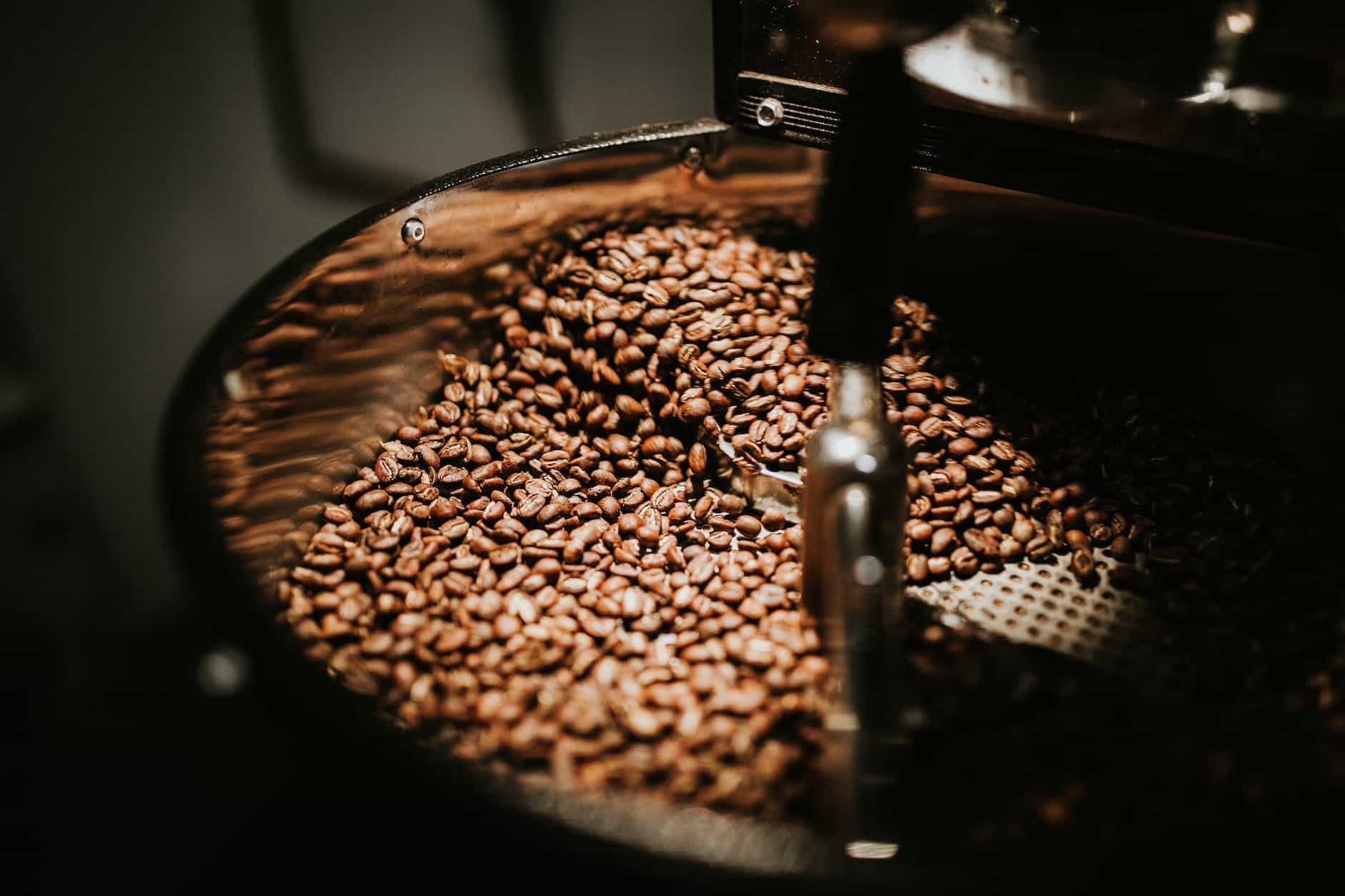
 Coffee Basics1 week ago
Coffee Basics1 week ago11 Best Medium Roast Coffees For Your Perfect Cup
-

 Coffee Basics1 week ago
Coffee Basics1 week agoStarbucks Venti Drinks: Customization And Pricing Guide
-

 Coffee Basics5 days ago
Coffee Basics5 days agoPerfect Your Espresso With Puck Screens: A Barista’s Secret
-

 Cappuccino Oracle Selected Reviews3 days ago
Cappuccino Oracle Selected Reviews3 days agoSmeg Knife Block Review Review [2024]
-
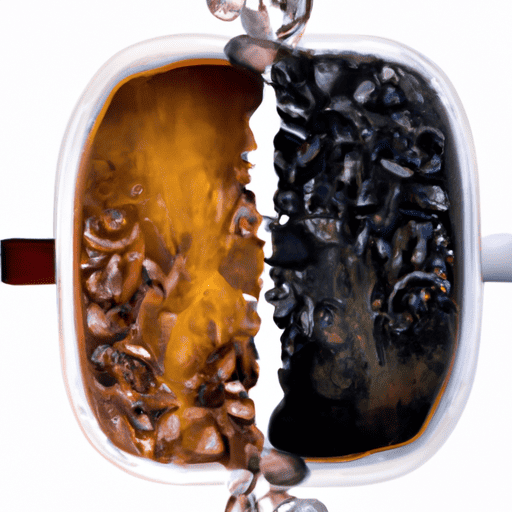
 Coffee Basics1 week ago
Coffee Basics1 week agoWhat Is Half-Caff Coffee? (And How Much Caffeine Is In It?)
-

 Coffee Basics1 week ago
Coffee Basics1 week ago9 Best Ground Coffee Brands For Your Perfect Cup
-

 Coffee Basics2 days ago
Coffee Basics2 days agoCan I Drink Coffee After Botox





